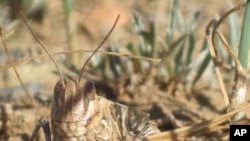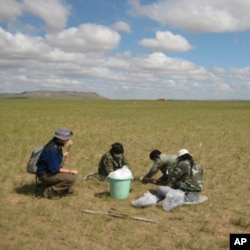Livestock overgrazing can lead to outbreaks of ravenous locusts, according to a new study.
Overgrazing is already known to lead to erosion and reduce the fertility of pasture lands.
But the researchers were surprised to find overgrazed, nutrient-poor land in Inner Mongolia was actually fertile ground for a species of locust native to the region.
"It's a counter-intuitive result," says Arianne Cease at Arizona State University, lead author of the study published in Science.
Cease and her team thought the locusts they studied might not form swarms if they had access to well-fertilized vegitation which was high in protein.
Locust killer
“What we found was that the high-protein diet was actually very deleterious to this locust. It caused most of them to die." On the other hand, she says, they found this particular locust thrived on low-protein grasses found on eroded, overgrazed land. "They actually need what's typically thought of as a poor-quality food to build up to high population levels."
University of Sydney biologist Stephen Simpson notes that, as the Eurasian grasslands have been degraded by livestock grazing and erosion, locust outbreaks have increased.
"The authors have shown that they are indeed linked," he says. "Understanding this relationship will help in the development of land management practices that reduce the locust threat."
Fertilizing an over-grazed field to raise plants’ protein levels might actually help control this insect, according to Cease's research.
Different impacts
However, the same may not be true for all locusts, cautions Keith Cressman, chief of locust outbreak forecasting at the U.N. Food and Agriculture Organization.
Researchers have found just the opposite effect in desert locusts, which Cressman says are perhaps the most destructive. “When the insects eat leaves high in [protein], they will reproduce more, they will grow faster, they will increase in number, they will survive better and they’re just a healthier locust.”
Cressman says the relationships between livestock, land and locusts are complex and differ from place to place. More research will be needed to sort them out completely.
Cease plans studies in Africa on how grazing practices affect other species of locusts.





